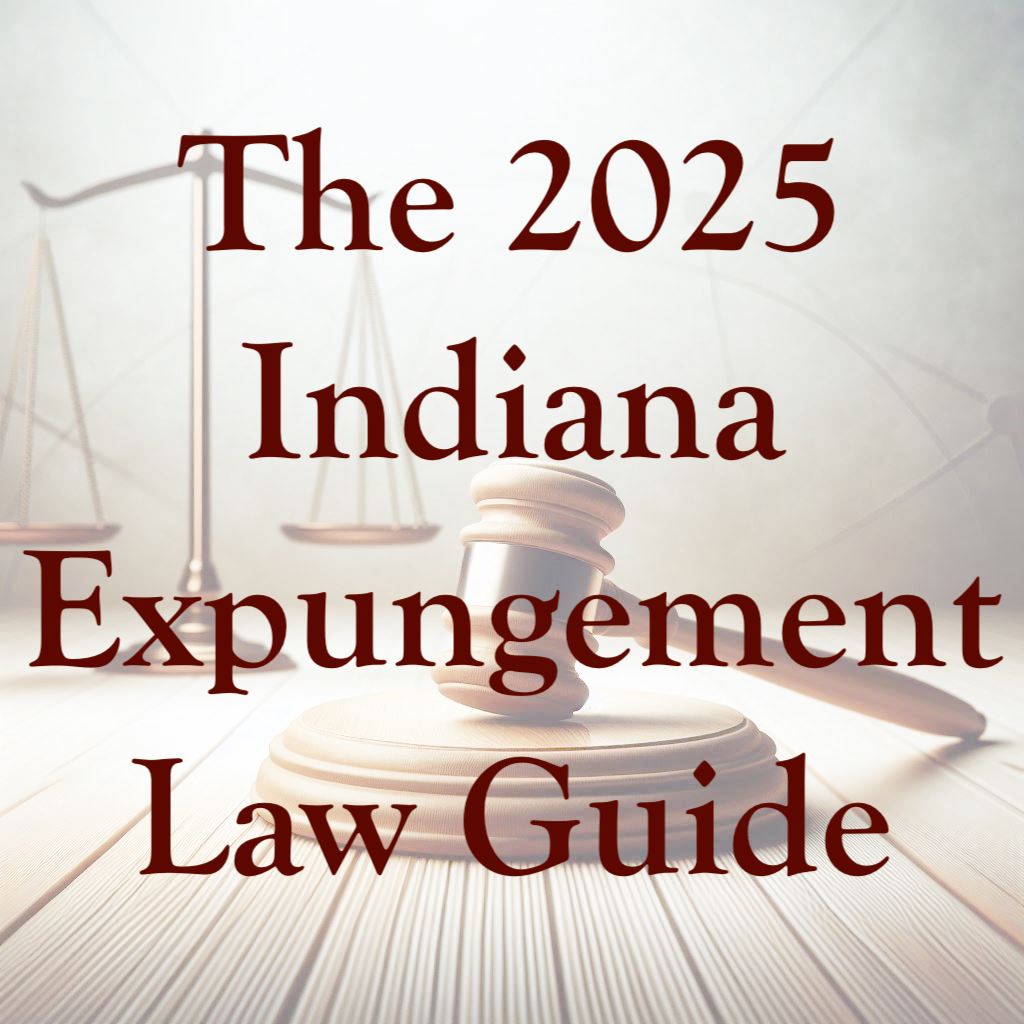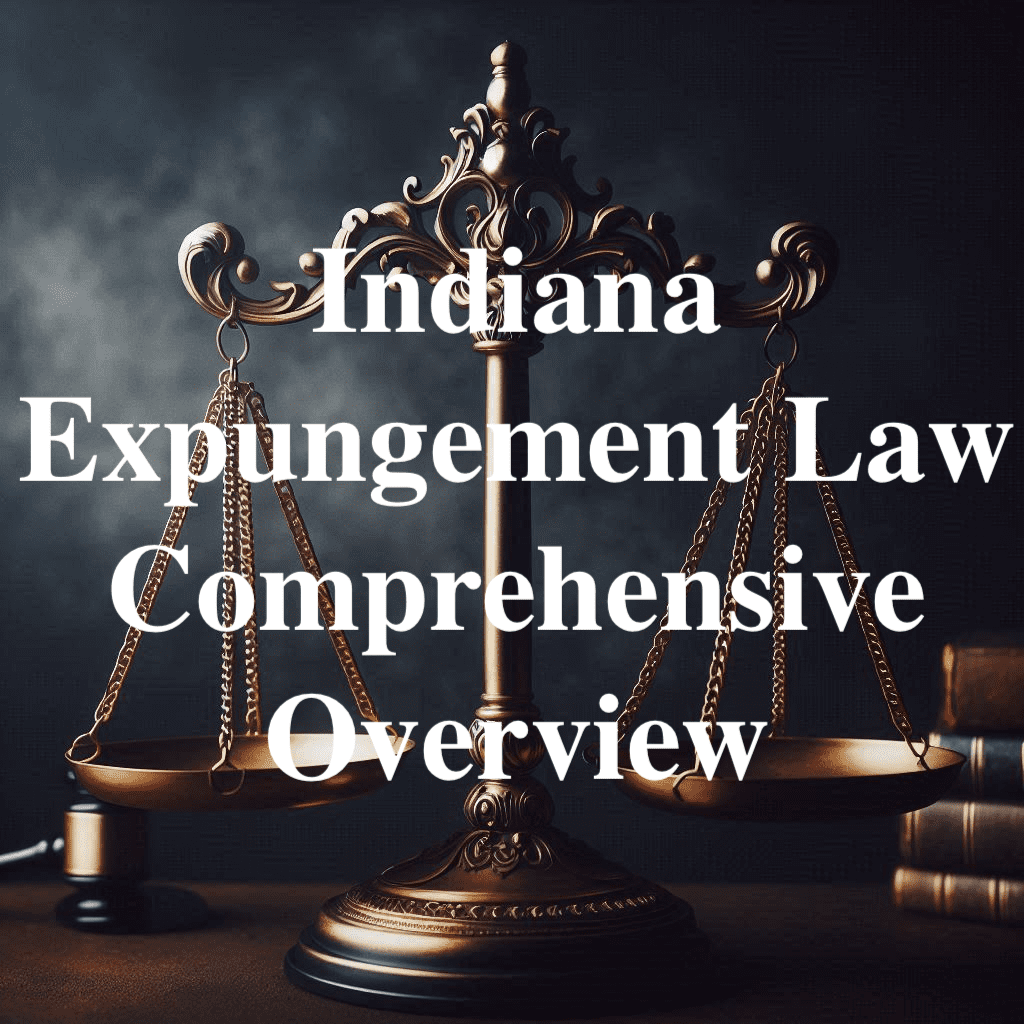In order to begin your Indiana Criminal Record Expungement application, call 317-695-7700. Expungement of your criminal record under the Indiana Second Chance Expungement Law has become much easier in recent years. You can also e-mail me at [email protected] If you are emailing me, make sure to include your date of birth and spelling of your name as it appears on mycase.in.gove offer a MONEY BACK GUARANTEE on ALL expungements. For the majority of expungements, no court appearance or office visit is necessary and we offer affordable prices.
2025 Indiana Expungement Law: A Comprehensive Overview of the Indiana Expungement Law

1. Introduction
Expungement in Indiana is a legal process that allows individuals to seal or expunge certain criminal records from public access. This process can significantly improve opportunities for employment, housing, and other aspects of life by reducing the stigma associated with a criminal record. Understanding the nuances of Indiana’s expungement law is crucial for those seeking to clear their records and move forward with their lives.

2. Eligibility Criteria
The eligibility criteria for expungement in Indiana vary depending on the nature of the offense and the time elapsed since the conviction or arrest. Here are the main categories:
2.1 Arrests Not Leading to Conviction
Individuals who were arrested but not convicted can petition for expungement. This includes cases where charges were never filed, charges were dismissed, or the individual was acquitted at trial. For example, if someone was arrested on suspicion of theft but the charges were later dropped, they could seek to have the arrest record expunged.
2.2 Misdemeanor Convictions
Misdemeanor convictions are eligible for expungement five years after the date of the last conviction. This category includes most misdemeanors, but certain offenses, such as those involving violence or sexual misconduct, may have additional restrictions. For instance, a person convicted of a minor drug possession offense could apply for expungement five years after completing their sentence.
2.3 Class D Felony or Level 6 Felony Convictions
Class D felonies (under the old classification system) and Level 6 felonies (under the current system) are eligible for expungement eight years after the date of conviction. These offenses are considered less severe than higher-level felonies and include crimes such as theft, drug possession, and certain types of fraud. For example, someone convicted of a Level 6 felony for theft could seek expungement eight years after their conviction.
2.4 Other Felony Convictions
More serious felony convictions may also be eligible for expungement, but the waiting period is longer, and additional criteria may apply. For example, certain violent felonies and sex offenses may require a longer waiting period or may not be eligible for expungement at all. A person convicted of a non-violent Class C felony might be eligible for expungement after a longer period, such as ten years.
3. Types of Records That Can Be Expunged
Expungement in Indiana can apply to various types of records, including arrest records, conviction records, and juvenile records. Each type has specific requirements and procedures.
3.1 Arrest Records
Arrest records can be expunged if no charges were filed, charges were dismissed, or the individual was acquitted. This process helps individuals clear their names and avoid the negative consequences of having an arrest record. For example, if someone was wrongfully arrested for a crime they did not commit, they could petition to have the arrest record expunged to prevent it from affecting their future opportunities.
3.2 Conviction Records
Certain misdemeanor and felony convictions can be expunged, as specified by the law. The eligibility criteria and waiting periods vary depending on the nature of the offense and the time elapsed since the conviction. For instance, a person convicted of a misdemeanor for public intoxication could apply for expungement five years after their conviction, while someone convicted of a Level 6 felony for drug possession would need to wait eight years.
3.3 Juvenile Records
Juvenile records can also be expunged under specific conditions. This process is designed to help young individuals move past their mistakes and avoid the long-term consequences of having a criminal record. For example, a juvenile who was adjudicated delinquent for a minor offense could seek to have their record expunged once they reach adulthood, provided they meet the eligibility criteria.
4. The Expungement Process
The expungement process in Indiana involves several steps, including filing a petition, notifying the prosecutor, possibly attending a court hearing, and receiving a court decision. Here is a detailed breakdown of each step:
4.1 Filing a Petition
The individual seeking expungement must file a petition in the court where the arrest or conviction occurred. The petition must include detailed information about the case, including the date of the arrest or conviction, the charges, and the outcome of the case. It is important to provide accurate and complete information to avoid delays or denials. For example, if someone was convicted of a misdemeanor for shoplifting, their petition should include the date of the arrest, the charges, and the final disposition of the case.
4.2 Notification
Once the petition is filed, the court notifies the prosecutor, who may object to the petition. The prosecutor has the right to review the petition and present any objections or concerns to the court. For instance, if the prosecutor believes that the petitioner has not met the eligibility criteria or that expungement is not in the interest of justice, they may file an objection.
4.3 Court Hearing
A court hearing may be held to determine eligibility and whether expungement should be granted. During the hearing, the petitioner may present evidence and arguments in support of their request for expungement. The prosecutor may also present objections or concerns. For example, the petitioner might present evidence of their rehabilitation, such as completion of a treatment program or letters of support from employers or community members.
4.4 Court Decision
The court will grant or deny the expungement based on the evidence and arguments presented. If the court grants the expungement, the records will be expunged and/or sealed and removed from public access. If the court denies the expungement, the petitioner may have the option to appeal the decision. For instance, if the court finds that the petitioner has met all the eligibility criteria and that expungement is in the interest of justice, it will likely order the records to be expunged.
5. Legal Implications of Expungement
Expungement has several legal implications, including the sealing of records, changes in disclosure requirements, and exceptions for certain entities.
5.1 Sealing of Records
Sealed records and not accessible to the public. This means that employers, landlords, and other members of the public cannot access the records through background checks or other means. For example, if someone has their misdemeanor conviction for disorderly conduct expunged, potential employers will not see this conviction on a background check.
5.2 Disclosure Requirements
Individuals are not required to disclose sealed records on job applications, housing applications, or other forms. This can significantly improve opportunities for employment, housing, and other aspects of life. For instance, a person with a sealed felony conviction for drug possession can legally state that they have not been convicted of a felony on a job application.
5.3 Exceptions
Certain entities, such as law enforcement agencies, may still access expunged records under specific circumstances. For example, expunged records may be accessed for law enforcement purposes, background checks for certain types of employment, or other legal reasons. For instance, a person applying for a law enforcement position may still have their expunged records reviewed as part of the background check process.
6. Recent Amendments and Updates
Indiana’s expungement law has undergone several amendments and updates in recent years. These changes have expanded eligibility criteria, streamlined the process, and introduced new provisions for automatic expungement.
6.1 Automatic Expungement
In some cases, records may be automatically expunged without the need for a petition. This provision applies to certain types of records, such as arrests not leading to conviction, and is designed to simplify the expungement process. For example, if someone was arrested but never charged, their arrest record might be automatically expunged after a certain period.
6.2 Changes in Eligibility
Recent amendments have expanded the eligibility criteria for expungement, allowing more individuals to qualify for the process. These changes include shorter waiting periods for certain offenses and broader eligibility for misdemeanor and felony convictions. For instance, a recent amendment might reduce the waiting period for expunging a misdemeanor conviction from five years to three years.
7. Benefits of Expungement
Expungement offers several benefits, including improved employment opportunities, better housing access, and reduced social stigma.
7.1 Employment Opportunities
Expungement can remove barriers to employment by sealing criminal records. This allows individuals to apply for jobs without disclosing their criminal history, improving their chances of securing employment. For example, a person with an expunged misdemeanor conviction for petty theft can apply for retail jobs without worrying about their criminal record affecting their chances.
7.2 Housing Access
Landlords may not access expunged records, improving housing prospects for individuals with expunged records. This can help individuals find stable housing and avoid discrimination based on their criminal history. For instance, someone with an expunged felony conviction for drug possession can apply for rental housing without the landlord seeing their criminal record.
7.3 Social Stigma
Expungement reduces the social stigma associated with a criminal record, allowing individuals to move forward with their lives without the burden of their past mistakes. This can improve self-esteem, mental health, and overall quality of life. For example, a person with an expunged misdemeanor conviction for disorderly conduct can participate in community activities without fear of judgment or discrimination.
8. Challenges and Considerations
While expungement offers many benefits, there are also challenges and considerations to keep in mind.
8.1 Legal Assistance
Navigating the expungement process can be complex, and legal assistance is often recommended. A professional can help individuals understand their eligibility, prepare the necessary documents, and represent them in court. For example, a professional can assist in gathering evidence of rehabilitation, such as certificates of completion for treatment programs or letters of support from employers and community members.
8.2 Filing Fees
There may be fees associated with filing a petition for expungement. These fees can vary depending on the court and the nature of the case. Some individuals may qualify for fee waivers or financial assistance. For instance, a person with limited financial resources might be able to apply for a fee waiver to reduce the cost of filing their petition.
8.3 Waiting Periods
Specific waiting periods must be met before filing for expungement. These waiting periods vary depending on the nature of the offense and the time elapsed since the conviction or arrest. For example, a person convicted of a misdemeanor must wait five years from the date of the last conviction before applying for expungement, while someone convicted of a Level 6 felony must wait eight years from the date of the last conviction.
8.4 Multiple Convictions
Individuals with multiple convictions may face additional challenges in seeking expungement. The law may have specific provisions for handling multiple convictions, and the process can be more complex. For instance, a person with both misdemeanor and felony convictions may need to file separate petitions for each conviction and meet different eligibility criteria for each.
8.5 Impact on Civil Rights
Expungement can restore certain civil rights, such as the right to vote, the right to serve on a jury, and the right to hold public office. However, the restoration of these rights may vary depending on the nature of the offense and the specific provisions of the expungement order. For example, a person with an expunged felony conviction may regain their right to vote but may still face restrictions on owning firearms.
8.6 Employment and Licensing
While expungement can improve employment opportunities, certain professions and licensing boards may still consider expunged records. For example, individuals seeking employment in law enforcement, healthcare, or education may be required to disclose expunged records as part of the background check process. Licensing boards for professions such as law, medicine, and real estate may also have specific requirements regarding expunged records.
9. Resources and Support
Several resources and organizations can provide support and assistance for individuals seeking expungement in Indiana.
10.1 Legal Aid Organizations
Legal aid organizations offer free or low-cost legal assistance to individuals who do not have income. These organizations can help with the expungement process, including filing petitions and representing clients in court. Examples of legal aid organizations in Indiana include Indiana Legal Services and the Neighborhood Christian Legal Clinic.
10.2 Expungement Clinics
Expungement clinics are events where individuals can receive free legal assistance with the expungement process. These clinics are often hosted by legal aid organizations, law schools, and community groups. Participants can receive help with determining eligibility, preparing petitions, and understanding the expungement process.
10.3 Online Resources
Several online resources provide information and guidance on the expungement process in Indiana. These resources include websites, guides, and toolkits that explain the eligibility criteria, steps involved, and necessary forms. Examples of online resources include the Indiana Courts website and the Indiana Legal Help website.
11. Conclusion
Indiana’s expungement law provides a valuable opportunity for individuals to clear their criminal records and improve their lives. Understanding the eligibility criteria, process, and benefits is crucial for those seeking expungement. While the process can be complex and challenging, the potential benefits make it a worthwhile endeavor for many individuals.
In order to begin your Indiana Criminal Record Expungement application, call 317-695-7700. We handle expungements in the entire state of Indiana, including: Adams County, Allen County, Bartholomew County, Benton County, Blackford County, Boone County, Brown County, Carroll County, Cass County, Clark County, Clay County, Clinton County, Crawford County, Daviess County, Dearborn County, Decatur County, DeKalb County, Delaware County, Dubois County, Elkhart County, Fayette County, Floyd County, Fountain County, Franklin County, Fulton County, Gibson County, Grant County, Greene County, Hamilton County, Hancock County, Harrison County, Hendricks County, Henry County, Howard County, Huntington County, Jackson County, Jasper County, Jay County, Jefferson County, Jennings County, Johnson County, Knox County, Kosciusko County, LaGrange County, Lake County, LaPorte County, Lawrence County, Madison County, Marion County, Marshall County, Martin County, Miami County, Monroe County, Montgomery County, Morgan County, Newton County, Noble County, Ohio County, Orange County, Owen County, Parke County, Perry County, Pike County, Porter County, Posey County, Pulaski County, Putnam County, Randolph County, Ripley County, Rush County, Saint Joseph County, Scott County, Shelby County, Spencer County, Starke County, Steuben County, Sullivan County, Switzerland County, Tippecanoe County, Tipton County, Union County, Vanderburgh County, Vermillion County, Vigo County, Wabash County, Warren County, Warrick County, Washington County, Wayne County, Wells County, White County, Whitley County, Indianapolis, Fort Wayne, Evansville, Fishers, South Bend, Carmel, Bloomington, Hammond, Noblesville, Lafayette, Gary, Greenwood, Westfield, Columbus, Jeffersonville, Lawrence, West Lafayette, Portage, New Albany, Merrillville, Plainfield, Richmond, Goshen, Valparaiso, Michigan City, Granger, Crown Point, Schererville, Zionsville, Brownsburg, Munster, Anderson, Elkhart, Mishawaka, Highland, Kokomo, Franklin, La Porte, Clarksville, Seymour, Avon, Shelbyville, Logansport, New Haven, Huntington, Marion, Greenfield, Lebanon, Vincennes, Beech Grove, Jasper, Bedford, New Castle, Warsaw, Auburn, Peru, Crawfordsville, Dyer, Wabash, Bluffton, Whiteland, Greencastle, Kendallville, Mooresville, Danville, Madison, Decatur, Plymouth, Speedway, Martinsville, Yorktown, Angola, Princeton, Brazil, Charlestown, Tell City, Scottsburg, Batesville, Garrett, Nappanee, Mount Vernon, North Vernon, Boonville, Huntingburg, Salem, Rochester, Gas City, Westville, Columbia City, Linton, Rensselaer, Monticello, Georgetown, Ellettsville, Cedar Lake, Rushville, Chandler, St. John, Ligonier, Winfield, and Whitestown.
DISCLAIMER – The information contained on this website is provided for educational and informational purposes only, and should not be construed as legal advice or as an offer to perform legal services on any subject matter. The content of this web site contains general information and may not reflect current legal developments or information. The information is not guaranteed to be correct, complete or current. We make no warranty, expressed or implied, about the accuracy or reliability of the information at this website or at any other website to which it is linked. Recipients of content from this site should not act or refrain from acting on the basis of any information included in the site without seeking appropriate legal advice on the particular facts and circumstances at issue from one who is licensed in the recipient’s state. Nothing herein is intended to create a client relationship and shall not be construed as legal advice. This is not an offer to represent you, nor is it intended to create a client relationship.

